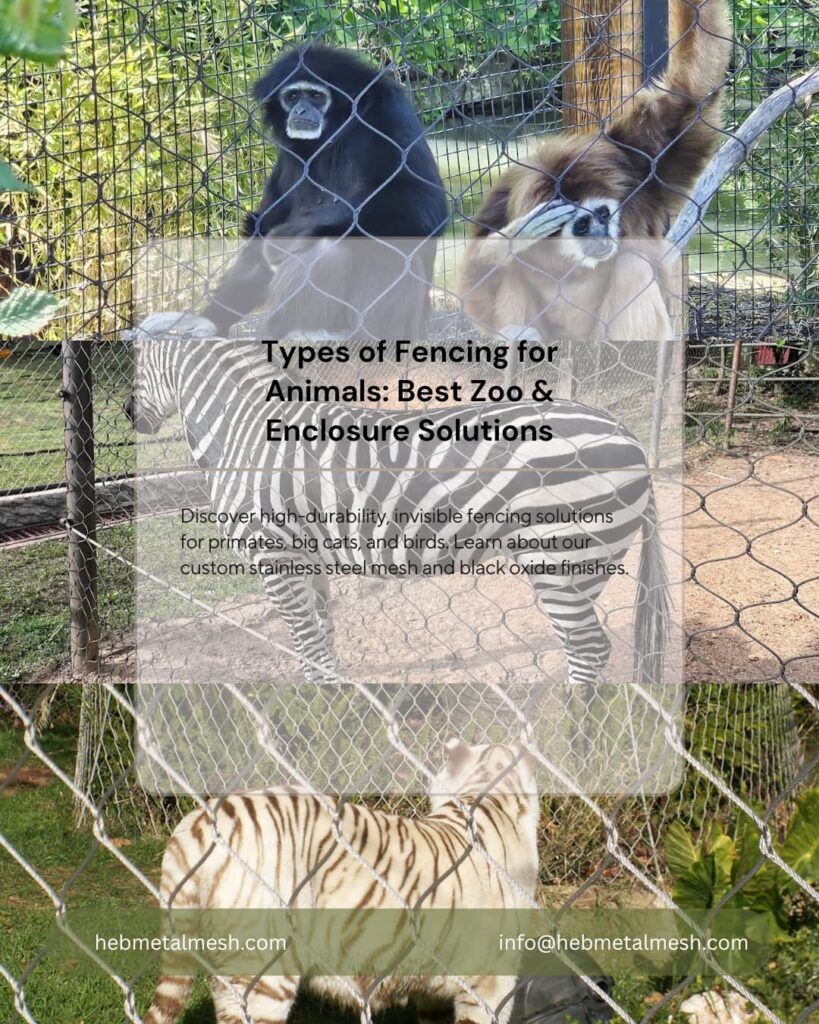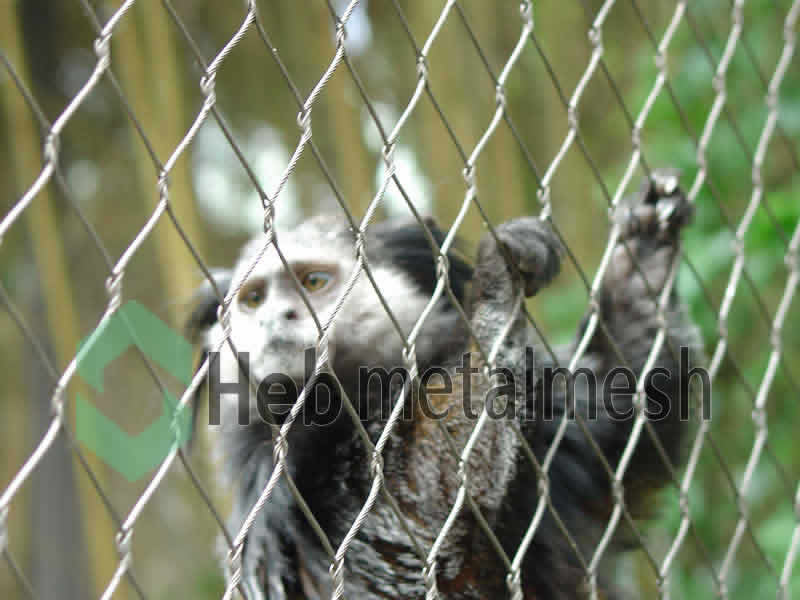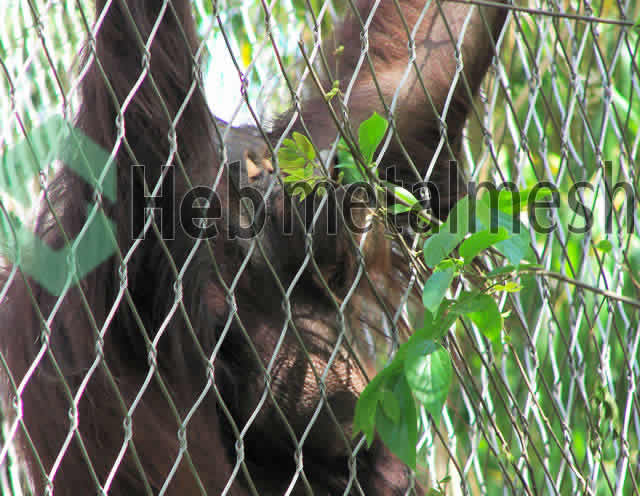In the world of modern zoological design and wildlife management, the choice of containment is no longer just about keeping animals “in.” It is a complex science that balances animal welfare, public safety, structural longevity, and—perhaps most importantly—the visitor experience. Choosing between the various types of fencing for animals can be the difference between a high-maintenance, visually obstructive cage and a seamless, naturalistic habitat.
At Hebmetalmesh, we have spent years at the intersection of metallurgy and wildlife conservation. We understand that a primate enclosure in a high-traffic city zoo has vastly different requirements than a remote bird park aviary or a private farm perimeter.
In this exhaustive guide, we will analyze the primary fencing solutions available today, evaluate their performance across different species, and explain why custom-engineered stainless steel solutions are becoming the global standard for prestigious zoological institutions.
Key Takeaways for Zoo Directors and Exhibit Designers
If you are looking for a quick summary of modern animal containment trends, keep these points in mind:
- Safety First: Containment must prevent both escape and “intruder” entry while being soft enough to prevent animal injury.
- Visibility Matters: Black oxide finishes are the industry standard for making fences “disappear” for the public.
- Material Selection: Grade 316 stainless steel is essential for coastal or high-corrosion environments.
- Customization Saves Money: Ordering custom-sized rolls eliminates on-site cutting waste and reduces labor costs.
- Sustainability: Stainless steel mesh has a 30+ year lifespan, making it the most cost-effective long-term investment.
I. Understanding Animal Containment Requirements: The Three Pillars
Before selecting a material, designers must evaluate three critical pillars:
1. Security and Impact Resistance
The primary function of any fence is containment. However, “security” varies by species. A tiger requires high tensile strength and resistance to blunt force impact. A primate requires a mesh that cannot be unraveled or used as a tool. Our handwoven stainless steel mesh is designed with a knotted structure that distributes impact energy across the entire panel, rather than stressing a single point. This “dynamic” resistance is far superior to the “static” resistance of rigid bars.
2. Animal Welfare and Physical Safety
Traditional fencing like chain link can often cause “beak damage” in birds or dental injuries in climbing mammals who gnaw on the wire. Furthermore, zinc-coated (galvanized) products can lead to heavy metal poisoning in certain species. High-quality fencing must be smooth to the touch, non-toxic, and flexible enough to prevent injury if an animal runs into it during a fright.
3. Aesthetics and “The Invisibility Factor”
For zoos and wild parks, the goal is to make the fence disappear. A heavy, shiny galvanized fence creates a “prison” atmosphere that detracts from the education and conservation mission. Modern solutions, such as Black Oxide Stainless Steel Mesh, are specifically designed to absorb light rather than reflect it. This allows the human eye to focus on the animal and the landscape, effectively making the barrier invisible.
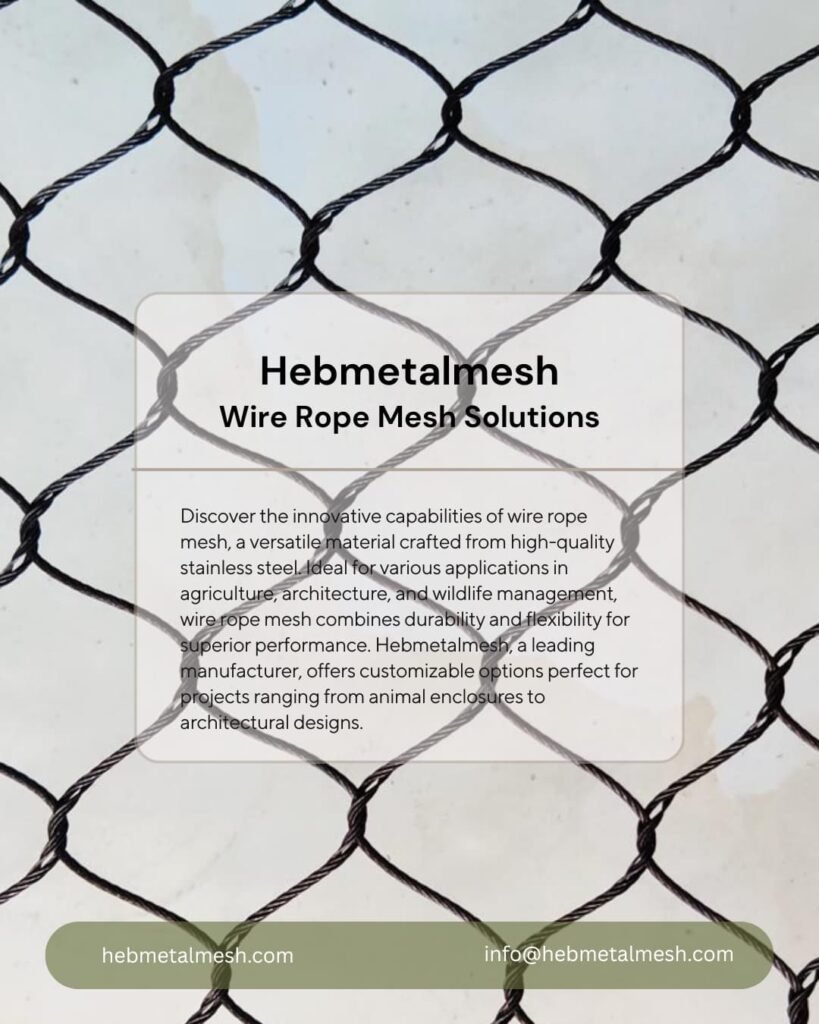
II. Quick Comparison: Types of Fencing at a Glance
For those in the planning stages, here is a high-level overview of how common materials compare:
| Fencing Type | Durability | Visibility | Flexibility | Best Use Case | Longevity |
|---|---|---|---|---|---|
| Handwoven Stainless Steel | Extreme | Excellent | High | Zoos, Aviaries, High-End Farms | 30+ Years |
| Chain Link | Moderate | Poor | Low | Temporary containment, Perimeters | 5-10 Years |
| Welded Wire Panels | High | Fair | None | Small mammals, rigid farm cages | 10-15 Years |
| Electric Fencing | Low | Great | N/A | Cattle, secondary cat containment | 5 Years |
| Plastic/Poly Netting | Very Low | Good | High | Temporary bird control | 1-2 Years |
III. Detailed Analysis of Fencing Types
1. Handwoven Stainless Steel Mesh (The Gold Standard)
Often referred to as “Rope Mesh” or “Zoo Mesh,” this is the flagship product of the Hebmetalmesh brand. Unlike machine-made fencing, this is hand-knotted from high-quality stainless steel wire rope.
- Customization Without Compromise: One of our core values is providing customized roll sizes at no additional cost. We believe you shouldn’t have to pay a premium for a fence that actually fits your project. By manufacturing to your specific length and height, we help you save up to 20% on material waste.
- Scale and Scope: We specialize in large-scale animal containment systems. Our ability to produce large panels up to 30′ x 60′ means fewer seams. Fewer seams mean fewer points of weakness and a more beautiful, uninterrupted view for visitors.
- The Black Oxide Advantage: Our black oxide finish isn’t just a coating; it’s a chemical conversion that turns the steel black. It won’t peel, chip, or flake even under extreme weather.
2. Chain Link Fencing
Chain link is the most common sight in older animal parks due to its low initial cost. However, for professional animal containment, it presents several issues:
- Aesthetic Failure: The thick wires create a visual “screen” that ruins photography.
- Maintenance Nightmare: It sags over time and requires constant tensioning.
- Safety Hazards: The “knuckle” or “twist” at the top and bottom of chain link can catch wings or paws, leading to severe injuries.
3. Welded Wire Panels
Welded wire is useful for rigid applications, such as a backyard chicken coop or a small mammal exhibit.
- Pros: It provides a very “clean” look for rectangular structures.
- Cons: The welds are points of failure. In cold climates, the expansion and contraction of the metal can snap welds. Once one weld goes, the integrity of the whole panel is compromised, and animals can quickly expand the hole.
IV. Featured Product Showcase: The Hebmetalmesh Collection
When selecting the specific “type of fencing for animals,” the mesh structure is the most important variable. Here are our top-performing products:
HM1250 – The Aviary Specialist
- Wire Diameter: 1.2mm (3/64″)
- Mesh Opening: 1″ x 1″ to 2″ x 2″
- Best For: Macaws, parrots, and mixed-species walk-through aviaries.
- Why it works: It is light enough to be supported by simple cable structures but strong enough to withstand the powerful beaks of large parrots.
HM2050 – The Primate & Small Carnivore Choice
- Wire Diameter: 2.0mm (5/64″)
- Mesh Opening: 2″ x 2″
- Best For: Gibbons, lemurs, raccoons, and foxes.
- Why it works: Provides excellent climbing texture for primates while maintaining a high break load that can handle the active, playful nature of monkeys.
HM3276 – The Apex Predator Barrier
- Wire Diameter: 3.2mm (1/8″)
- Mesh Opening: 3″ x 3″ or 4″ x 4″
- Best For: Tigers, lions, leopards, and bears.
- Why it works: With a breaking strength exceeding several tons per square meter, this mesh is designed for high-impact safety in big cat habitats.
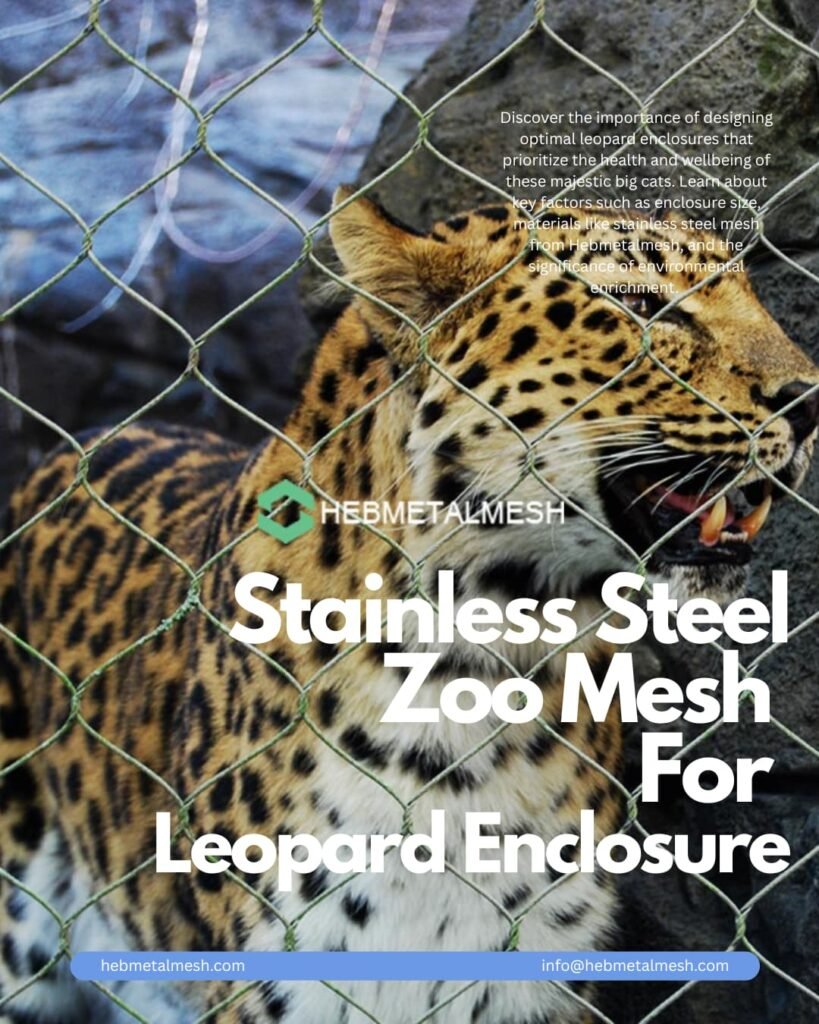
V. Species-Specific Fencing Logic: A Deeper Dive
The Primate Enclosure
Primates are among the most difficult animals to contain because they are “hand-active.” They will pick at welds, pull at loose wires, and try to find any weakness.
- The Hebmetalmesh Solution: Our handwoven knots are interlocking and fixed. Because there are no sharp edges or loose ends, primates cannot manipulate the fence. The 3D texture of the mesh also mimics the feel of vines and branches, encouraging natural climbing behaviors.
Large Aviaries and “Flight” Enclosures
The trend in modern bird parks is the “walk-through” aviary. These require massive spans of mesh that don’t need heavy support columns.
- The Hebmetalmesh Solution: Because our stainless steel rope mesh is incredibly lightweight relative to its strength, designers can create “tent-like” structures with minimal steel poles. Using our nature or black oxide finishes, the sky remains visible to the birds, reducing “tunnel vision” stress.
Big Cats and Large Mammals
Containment for lions and tigers must account for “lunge force.”
- The Hebmetalmesh Solution: Unlike rigid bars which can break a cat’s tooth or bone upon impact, our mesh has a “rebound” effect. It absorbs the kinetic energy of a 250kg tiger and safely pushes the animal back. This makes it the safest choice for both the animal and the keeper.
Farm and Garden Security
For high-end residential gardens or specialized farms (such as deer farms or alpaca ranches), aesthetics are as important as security.
- The Hebmetalmesh Solution: Our mesh protects gardens from deer and predators without blocking the view of the landscape. It is also an excellent trellis for climbing plants, as the stainless steel will not rot or rust when in contact with vegetation.

VI. Technical Specifications & Material Science
For architects and engineers, the durability of the mesh is a mathematical certainty, not a guess.
304 vs. 316 Stainless Steel
- Grade 304: Perfect for inland zoos, gardens, and farms. It offers excellent rust resistance and high strength.
- Grade 316: The “Marine Grade.” This is essential for zoos located near the ocean or in cities with high air pollution. It contains molybdenum, which prevents pitting corrosion from salt spray.
Wire Rope Construction
- 7×7 Construction: Provides a balance of flexibility and stiffness. Ideal for medium-sized mesh openings.
- 7×19 Construction: Highly flexible. Used for larger wire diameters to ensure the mesh can still be handwoven and draped over complex 3D shapes.
Custom Roll Size Economics
Standard factory rolls are often 100 feet long. If your enclosure is 112 feet long, you have to buy two rolls and waste 88 feet. Hebmetalmesh eliminates this. We weave the roll to exactly 112 feet. You pay only for what you use, and you save hours of labor on-site.
VII. Installation Guide: Tips for Success
Proper installation is key to the longevity of any animal fencing.
- Frame Preparation: Ensure your support cables or steel frames are rated for the tension of the mesh.
- Tensioning: The mesh should be pulled taut but not over-stressed. A properly tensioned mesh will have a uniform diamond shape.
- Seaming: Use high-quality stainless steel ferrules or lacing wire to join panels. With our 30′ x 60′ panels, you will have far fewer seams to manage.
- Grounding: For burrowing animals, ensure the mesh is buried at least 1-2 feet underground to prevent escape.
VIII. Why Stainless Steel is a Sustainable Investment
When calculating the cost of types of fencing for animals, look at the “Total Cost of Ownership” (TCO):
- Installation Labor: Large, custom-sized panels from Hebmetalmesh install 30% faster than standard rolls because there is less cutting and joining work.
- Maintenance: Our mesh requires zero painting, zero rust treatment, and zero tightening once installed.
- Replacement Cycle: A galvanized fence may need replacement every 7 years due to rust and sagging. Our stainless steel mesh lasts 30+ years.
- Animal Health: Fewer vet visits due to “fence injuries” means higher profitability and better welfare ratings for your facility.
IX. Frequently Asked Questions (FAQ)
The industry standard is handwoven stainless steel rope mesh. Its combination of high tensile strength, flexibility, and longevity makes it superior to chain link, welded wire, or plastic netting.
Both are made of high-grade stainless steel and have the same structural lifespan. However, the black oxide finish is preferred for exhibits because it significantly reduces glare and improves the visitor experience.
Yes. At Hebmetalmesh, we provide customized roll sizes to your exact dimensions with no additional cost. This reduces waste and simplifies installation for everyone from home gardeners to international contractors.
Yes. Unlike plastic or poly-netting, stainless steel rope mesh cannot be chewed through by rodents, primates, or carnivores.
X. Conclusion: Designing for the Future
Selecting the right fencing is a legacy decision. The enclosures built today will house animals for decades to come. By choosing a specialized manufacturer like Hebmetalmesh, you are ensuring that your animals are safe, your visitors are captivated, and your maintenance budget is protected.
Our commitment to quality, from our hand-weaving process to our specialized black oxide finish, has made us a trusted partner for zoos, farms, and gardens worldwide. Whether you need a small roll for a private aviary or massive panels for a multi-acre wild park, we have the engineering expertise to support your vision.
Take the next step in your project today:
- Online Shop: Buy Mesh Rolls and Panels Online – Direct shipping available.
- Project Gallery: https://hebmetalmesh.com/downloads/ – Explore hundreds of real-world installations.
- Expert Advice: Contact us for a Custom Quote – Our engineers will help you choose the right specs.
